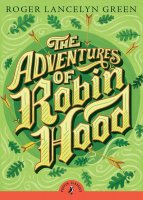
 King Arthur and His Knights of the Round Table by Roger Lancelyn Green (1953)
King Arthur and His Knights of the Round Table by Roger Lancelyn Green (1953)
The Adventures of Robin Hood by Roger Lancelyn Green (1956)
Roger Lancelyn Green's assembling and retelling of the stories of King Arthur and of Robin Hood makes me want to read his other collections of ancient tales (e.g. Egyptian, Greek, and Norse); he writes well and provides an excellent introduction to these classic stories. The only negative I would report about these particular editions is that the publisher apparently decided it would be a good idea to append a stomach-turning school-ish section. ("Can you see any similarities between Arthur and modern heroes such as Harry Potter or Luke Skywalker?") Somehow I don't think Green would have approved at all.
One thing I found delightful in both books was recognizing in Green's work echoes of the writing of C. S. Lewis and J. R. R. Tolkien. Not in the sense of copying or imitation, but that they all spring from the same roots.
Another is that these stories of chivalry and idealized behavior make it clear both that heroes are flawed people, and that they are nonetheless heroes.
In the 1950's and early 1960's, when I was young, our hero stories were highly sanitized—and not just those for children. What mattered was the good that was done; negative events and characteristics were largely ignored. Fables are expected to be larger-than-life (think Paul Bunyan), but real people, no matter how amazing, should be, well, real people. It's important to know that God can do extraordinary things with ordinary people—being weak, fallen, broken, and/or stupid is no excuse for not doing the right thing.
Later decades turned the idealized hero narrative 180 degrees. It became de rigueur to take the people we admire and portray them not so much as flawed, but evil; to take delight in showing people at their worst, and pointing out that the good they did might have actually been harmful. This may have been a necessary corrective for a brief time, but it is the worse of the two errors.
Green does not hesitate to admit the flaws, errors, and sins of his characters, but lets their heroic actions shine. It's a good balance.


